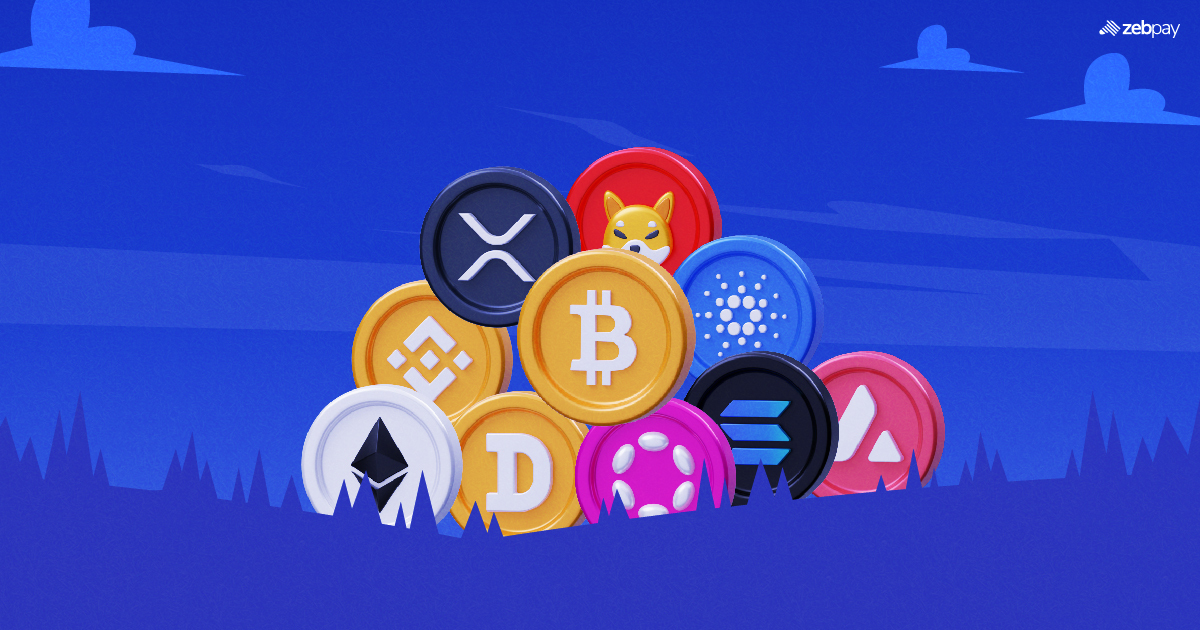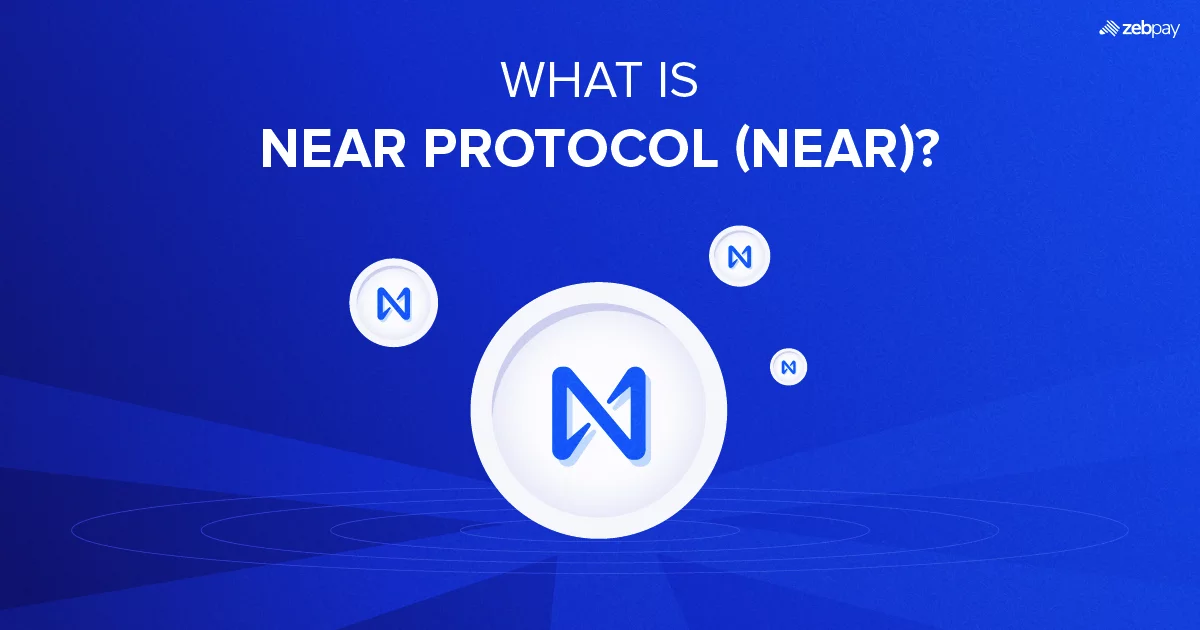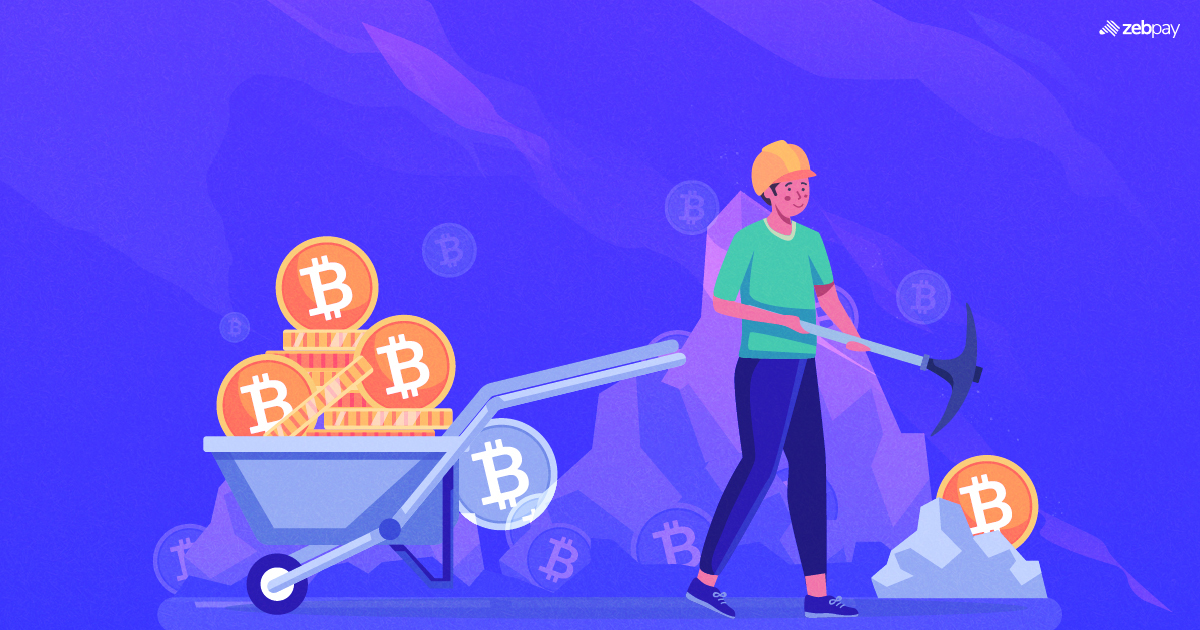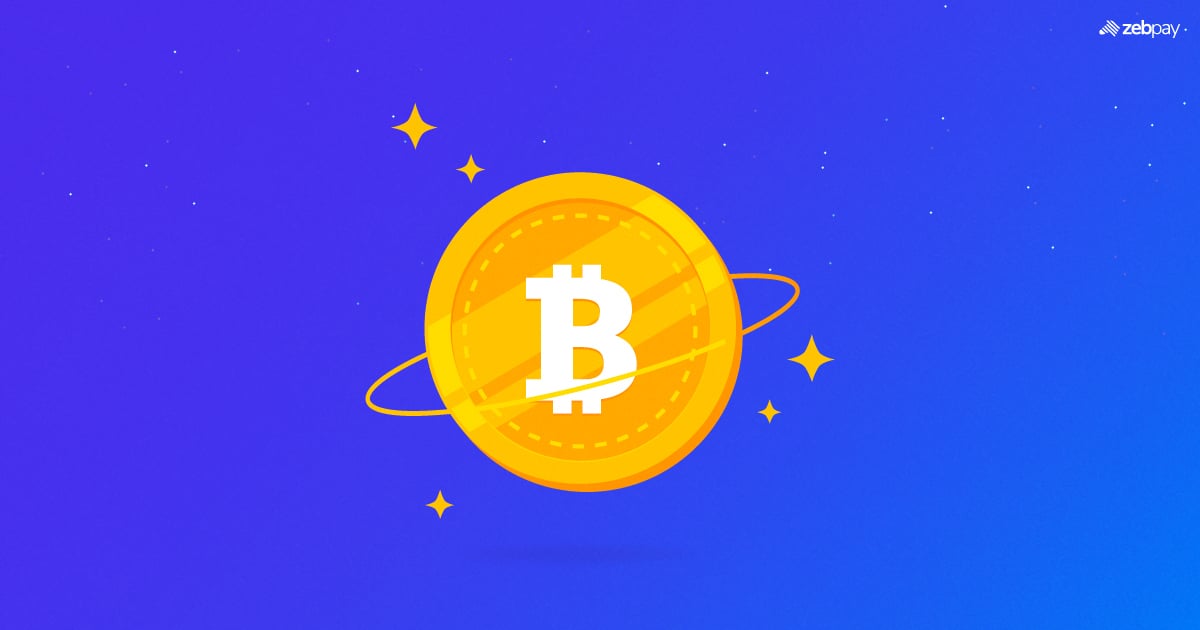Over the past few years, Crypto has established itself as a notable player in the financial markets contending for a position in several investors’ portfolios. However, for those who are new to investing in the crypto market, grasping the current state of the industry and making informed choices can be quite an uphill task. To shed some light on the crypto market, we have curated a selection of a few well-recognized crypto assets in this blog post. It is essential to remember that this list is based on internal research and should not be regarded as investment advice. We strongly recommend all investors conduct thorough research before investing in the crypto market.
Introduction to Crypto
Crypto tokens are fundamentally digital assets grounded in cryptography. They derive value from unique use cases which each token or project is trying to solve. These tokens function within a blockchain, a decentralised, transparent ledger of transactions accessible to all. Notably, any data or transaction recorded on a blockchain is immutable and irrevocable.
In the present landscape, the crypto sector offers an expansive array of possibilities. From basic transactions to engaging with NFTs, sports platforms, and even gaming applications, you can explore a vast spectrum of platforms and experiences.
Top 10 Cryptos in 2024
| Coin | Market Capitalization | Current Price |
| Bitcoin (BTC) | $1.3 trillion | $66,089 |
| Ethereum (ETH) | $359 billion | $2995 |
| Binance Coin (BNB) | $85 billion | $580 |
| Solana (SOL) | $72 billion | $162 |
| Ripple (XRP) | $28 billion | $0.51 |
| Dogecoin (DOGE) | $22 billion | $0.15 |
| Tron (TRX) | $10 billion | $0.12 |
| Polkadot (DOT) | $9.9 billion | $6.9 |
| Cosmos (ATOM) | $3.2 billion | $8.43 |
| Maker (MKR) | $2.5 billion | $2769 |
Note: This list has been made based on internal research and should not be taken as investment advice. Investors should do their thorough research before buying or selling crypto assets.
Bitcoin (BTC)
The oldest and most popular crypto token on the market, Bitcoin was the coin that started the entire crypto craze. From its humble beginnings in 2009, it has soared to unimaginable heights and gained the attention of investors, the media and businesses.
The network is used as an alternative means of payment to cash and is protected through Proof of Work consensus. All transactions are stored on a blockchain, while miners can earn rewards for each block of transactions they confirm.
Pros of Bitcoin
- Most well-known token, which leads to heavy investments in the project.
- Relatively stable compared to some newer crypto tokens.
Cons of Bitcoin
- BTC operates on proof of work, which consumes a lot of electricity and requires excessive time to confirm transactions.
- As BTC acts as an index of the general crypto market, it rarely deviates from general market trends and conditions.
Ethereum (ETH)
After Bitcoin, Ethereum has established itself as one of the most dominant forces in the crypto market. It was the first to introduce smart contract functionality, which enables developers to create and automate several key features we take for granted today. Ethereum is also built to provide a platform for decentralised applications and finance, becoming the leading blockchain to service this need.
Pros of Ethereum
- The largest player in the DeFi and dApp space. This gives it market dominance and requires that competitors offer much greater incentives to switch.
- Ethereum’s Proof of Stake consensus mechanism has made the blockchain highly efficient. The future upgrades are focussed on increasing TPS and improving the already robust security protocols.
Cons of Ethereum
- Ethereum sometimes has high network traffic that can slow transactions down to a crawl. It must rely on scaling solutions to address the traffic on its network.
- Ethereum’s transaction costs can also skyrocket. In some cases, the fees can be higher than the value of the transaction.
Binance Coin (BNB)
Launched in 2017, BNB has evolved from a simple token to powering its own ecosystem. At first, BNB was used to provide special benefits to users of the Binance crypto exchange, such as lower fees, exclusive access to initial coin offerings and cashback.
Today, it forms the backbone of the BNB Chain ecosystem, which boasts high speed and low cost to compete with Ethereum’s dominance. It has established itself as a strong option in the market.
Pros of BNB
- Low costs and high throughput mean it can service much greater demand than many competitors.
- Owning BNB provides you benefits on the Binance exchange platform
Cons of BNB
- BNB is a highly centralized token, as it is controlled and managed by Binance. This reduces the freedom available to its community.
- BNB’s success is tied to Binance, which the regulators of several countries like the UK, Japan and Germany have targeted.
Solana (SOL)
Solana is a decentralised blockchain platform created for scalability first and foremost. It is one of the fastest blockchains on the market, with a transaction speed of almost 65,000 per second. It accomplishes this through the unique Proof of History consensus mechanism, which allows nodes to synchronise time across the network.
Solana has been one of the fastest-growing projects in the DeFi space and is widely called an “Ethereum-killer”.
Pros of Solana
- Solana is one of the fastest blockchains on the market, making it highly popular among investors.
- The platform also has very low transaction fees, with an average of $0.00025.
Cons of Solana
- Solana is not easily interoperable with Ethereum, thus restricting its smart contracts to those built for the network.
- Solana has experienced several network outages that have made it unreliable for its users.
Ripple (XRP)
Unlike other general-purpose tokens, XRP is focused on creating payment solutions for banks and financial institutions. It solves several problems with competing systems like SWIFT for international settlements. Instead of requiring several hours or days for transfers to be finalised, XRP allows such settlements to be completed in a matter of seconds.
Read more: What is Ripple (XRP)
Ripple has made traditional finance much more accessible for users through the efficient application of blockchain technology.
Pros of Ripple
- Much faster than its competitors like SWIFT.
- Expand access to banking and international settlement by lowering barriers to use.
Cons of Ripple
- The network is highly centralised as all transactions are confirmed by a federated group of financial institutions.
- Ripple Labs is engaged in a legal battle with the US Securities and Exchange Commission.
Dogecoin (DOGE)
Dogecoin is one of the most popular tokens among investors. Initially started as a joke on Bitcoin, it became an internet sensation that garnered a passionate and active community. Its unique value is that it is based on the popular “Doge” meme.
The project has been endorsed by several figures in the crypto community and celebrities like Elon Musk and Vitalik Buterin. It is important to note that Dogecoin is a memecoin and does not have intrinsic value, except for a strong community. Investors should conduct thorough due diligence before deciding to invest in Memecoins.
Pros of Dogecoin
- The unique value proposition of a Memecoin that has sustained its power in the market.
- Active community working for the token’s success.
Cons of Dogecoin
- No practical application, value is only based on a meme.
- There is no cap on the total supply of DOGE, which leads to inflation in the token.
Polkadot (DOT)
Polkadot is a Layer-0 protocol for connecting and securing several blockchains, allowing them to be interoperable. This enables transfers of all types of digital assets including tokens and smart contracts.
This protocol can connect private and public blockchains, oracle services and other networks. It enables information sharing across a wide variety of networks and protocols.
Pros of Polkadot
- Interoperability is the biggest selling point of the Polkadot protocol. It allows several different blockchains to access data and assets from each other.
- Polkadot is among the most active platforms for developers to create on.
Cons of Polkadot
- Polkadot has a lot of competition in this space, with alternatives like Cardano and Cosmos fighting for more market share.
- Slots for independent blockchains are sold via auction, making it difficult to acquire them without access to substantial funding.
SHIBA INU (SHIB)
Inspired by Doge, Shiba is another meme token with a dog face as a mascot.
Pros of Shiba
- Valuable Meme Crypto Brand: Shiba Inu has leveraged meme-friendly branding, similar to Dogecoin, to stand out in the crowded cryptocurrency market, gaining significant social media traction.
- Shibaswap: The creation of Shibaswap by Shiba Inu developers aims to enhance community engagement and brand building within the Shiba ecosystem.
- Potential for Robinhood Trading: Shiba Inu’s potential inclusion on platforms like Robinhood presents an opportunity for increased accessibility and trading volume.
Cons of Shiba
- Extreme Volatility: The rapid price fluctuations of Shiba Inu pose risks for investors, with the average holding period being just 13 days, indicating high volatility and potential for significant losses.
- Lack of Real-World Utility: Shiba Inu has limited real-world utility, is accepted by only a few dozen vendors globally, and lacks distinctive features to set it apart in the competitive cryptocurrency landscape.
Read more: Is Shiba a Good Investment
Cardano (ADA)
Cardano is a decentralized blockchain project designed as an open-source platform to support peer-to-peer transactions. Its structured architecture allows for smart contracts, ensuring adaptability and scalability while maintaining robust security measures.
Read more: What is Cardano (ADA)
Pros of Cardano
- Energy Efficiency: Cardano’s Proof-of-Stake (PoS) algorithm is more energy-efficient than Ethereum’s Proof-of-Work (PoW) system, resulting in lower transaction costs and reduced environmental impact.
- Scalability: Designed to handle a high volume of transactions per second, Cardano offers a highly scalable platform for decentralized applications (DApps) and smart contracts.
- Safety and Security: Utilizing the Haskell programming language known for its safety features, Cardano ensures a secure environment for complex smart contracts and DApps, enhancing overall platform security.
Cons of Cardano
- Limited Adoption: Despite its advantages, Cardano is still relatively new and has not achieved widespread adoption compared to platforms like Ethereum, resulting in fewer available DApps and smart contracts.
- Centralization Concerns: While decentralized, critics argue that Cardano may not be entirely decentralized, raising concerns about token distribution and governance within the platform.
Avalanche (AVAX)
Avalanche (AVAX) facilitates thousands of transactions per second in a trustless, decentralized manner, used for payments, staking, and securing the network.
Pros of Avalanche
- Rapid Transaction Processing: AVAX offers fast transaction processing times, allowing thousands of transactions per second in a fully trustless and decentralized manner.
- Incentives for Active Participation: The reward structure of AVAX incentivizes active participation within the network, encouraging users to engage and contribute to the ecosystem.
- Versatile Support for Blockchain Projects: AVAX provides versatile support for various blockchain initiatives, empowering developers to create diverse applications and projects within the Avalanche ecosystem.
Cons of Avalanche
- Competition from Ethereum: AVAX faces tough competition from established platforms like Ethereum, which may pose challenges in gaining market share and adoption.
- High Validator Staking Requirement: Validators in the Avalanche network are required to stake 2,000 AVAX tokens, which could be a barrier for some participants looking to engage in network validation.
- Lack of Penalties for Validators: Malicious or negligent validators in Avalanche are not penalized by losing their AVAX tokens, potentially impacting network security and integrity.
Conclusion
From general-purpose tokens to specific applications in finance or scalability, the crypto market has great choices for every type of investor. While these tokens include some of the easiest-to-recommend investments for newcomers, seasoned investors may find smaller, more volatile tokens to make riskier investments for higher returns.
You can buy 150+ crypto tokens on ZebPay. Stay up to date with the latest news on Crypto with ZebPay blogs.








